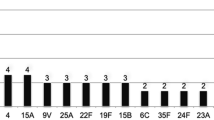Abstract
Patients who undergo splenectomy and recipients of allogeneic marrow (alloBMT) or peripheral stem cell transplantation are at increased risk of overwhelming infection from encapsulated organisms such as Streptococcus pneumoniae, Haemophilus influenzae and Neiserria meningitidis. As prophylaxis against these pathogens splenectomised patients are immunised and may also receive antibiotics for life. We report relapsing overwhelming sepsis caused by penicillin-resistant pneumococcus in a patient who was immunised and received prophylactic phenoxymethylpenicillin for 8 months following splenectomy and matched unrelated donor (MUD) marrow transplantation for refractory T cell lymphoma. No obvious focus of sepsis was found during any of the three episodes and S. pneumoniae serogroup 6, subtype 6B was isolated from blood cultures on each occasion. He was treated with i.v. cephalosporins, as the organisms were resistant to penicillin with a minimum inhibitory concentration (MIC) of 2.0, and there was complete resolution of symptoms each time. In the light of recurrent sepsis with this penicillin-resistant organism the decision was made to give prophylactic levofloxacin for the next 12 months. This case illustrates that the choice of prophylactic regimen and the treatment of sepsis in immunocompromised patients remain difficult and challenging issues. Bone Marrow Transplantation (2000) 26, 1017–1019.
This is a preview of subscription content, access via your institution
Access options
Subscribe to this journal
Receive 12 print issues and online access
$259.00 per year
only $21.58 per issue
Buy this article
- Purchase on Springer Link
- Instant access to full article PDF
Prices may be subject to local taxes which are calculated during checkout
Similar content being viewed by others
References
King H, Shumacker HB Jr . Splenic studies. I. Susceptibility to infection after splenectomy performed in infancy Ann Surg 1952 136: 239–242
Pearson HA, Gallagher D, Chilcote R et al. Development pattern of splenic dysfunction in sickle cell disorders Pediatrics 1985 76: 392–397
Rogers TR, Joshi R, White S et al. Severe pneumococcal infection and splenic atrophy occurring as complications of graft-versus-host disease after haplotype mismatched marrow transplants Exp Hematol 1983 2: (Suppl. 13) 123–124
Working Party of British Committee for Standards in Haematology, Haematology Task Force . Guidelines for the prevention and treatment of infection in patients with absent or dysfunctional spleen BMJ 1996 312: 430–434
Steele RW, Warrier R, Unkel PJ et al. Colonization with antibiotic-resistant Streptococcus pneumoniae in children with sickle cell disease J Pediatr 1996 128: 531–535
Winston DJ, Ho WG, Schiffman G et al. Pneumococcal vaccination of recipients of bone marrow transplants Arch Intern Med 1983 143: 1735–1737
Avanzini MA, Carra AM, Maccario R et al. Antibody response to pneumococcal vaccine in children receiving bone marrow transplantation J Clin Immunol 1995 15: 137–144
Holdsworth RJ, Irving AD, Cuschieri A . Postsplenectomy sepsis and its mortality rate: actual versus perceived risks Br J Surg 1991 78: 1031–1038
Siber GR, Weitzman SA, Aisenberg AC et al. Impaired antibody response to pneumococcal vaccine after treatment for Hodgkin's disease New Engl J Med 1978 299: 442–448
Zarrabi MH, Rosner F . Rarity of failure of penicillin prophylaxis to prevent postsplenectomy sepsis Arch Intern Med 1986 146: 1207–1208
Johnson AP, Speller DC, George RC et al. Prevalence of antibiotic resistance and serotypes in pneumococci in England and Wales: results of observational surveys in 1990 and 1995 BMJ 1996 312: 1454–1456
Jacobs M . Drug-resistant Streptococcus pneumoniae: rational antibiotic choices Am J Med 1999 106: 19S–25S
Engels EA, Lau J, Barza M . Efficacy of quinolone prophylaxis in neutropenic cancer patients: a meta-analysis J Clin Oncol 1998 16: 1179–1187
Biedenbach DJ, Jones RN . The comparative antimicrobial activity of levofloxacin tested against 350 clinical isolates of streptococci Diagn Microbiol Infect Dis 1996 25: 47–51
Fu KP, Lafredo SC, Foleno B et al. In vitro and in vivo antibacterial activities of levofloxacin (L-ofloxacin), an optically active ofloxacin Antimicrob Agents Chemother 1992 36: 860–866
Pfaller MA, Jones RN . Comparative antistreptococcal activity of two newer fluoroquinolones, levofloxacin and sparfloxacin Diagn Microbiol Infect Dis 1997 29: 199–201
Piddock LJ . New quinolones and Gram-positive bacteria Antimicrob Agents Chemother 1994 38: 163–169
Novak R, Henriques B, Charpentier E et al. Emergence of vancomycin tolerance in Streptococcus pneumoniae Nature 1999 399: 590–593
Machesky KK, Cushing RD . Overwhelming postısplenectomy infection in a patient with penicillin-resistant Streptococcus pneumoniae Arch Fam Med 1998 7: 178–180
Obaro SK, Monteil MA, Henderson DC . The pneumococcal problem BMJ 1996 312: 1521–1525
Leemans R, Manson W, Snijder JA et al. Immune response capacity after human splenic autotransplantation: restoration of response to individual pneumococcal vaccine subtypes Ann Surg 1999 229: 279–285
Jakobsen H, Saeland E, Gizurarson S et al. Intranasal immunization with pneumococcal polysaccharide conjugate vaccines protects mice against invasive pneumococcal infections Infect Immun 1999 67: 4128–4133
Evans DIK . Fatal post-splenectomy sepsis despite prophylaxis with penicillin and pneumococcal vaccine Lancet 1984 1: 1124–1125
Author information
Authors and Affiliations
Rights and permissions
About this article
Cite this article
Tauro, S., Dobie, D., Richardson, G. et al. Recurrent penicillin-resistant pneumococcal sepsis after matched unrelated donor (MUD) transplantation for refractory T cell lymphoma. Bone Marrow Transplant 26, 1017–1019 (2000). https://doi.org/10.1038/sj.bmt.1702647
Received:
Accepted:
Published:
Issue Date:
DOI: https://doi.org/10.1038/sj.bmt.1702647
Keywords
This article is cited by
-
References
Bone Marrow Transplantation (2009)
-
Invasive pneumococcal disease in adult hematopoietic stem cell transplant recipients: a decade of prospective population-based surveillance
Bone Marrow Transplantation (2008)
-
Efficacy of donor vaccination before hematopoietic cell transplantation and recipient vaccination both before and early after transplantation
Bone Marrow Transplantation (2004)



